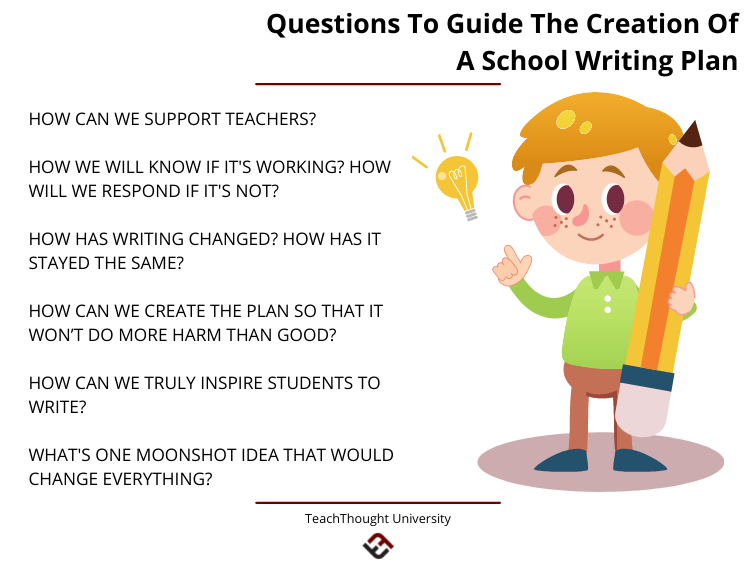What Is A School Writing Plan?
by Terry Heick
What Is A School Writing Plan?
This part’s simple enough: a school writing plan is simply a documented, formal, and revisable approach to promoting the ability and tendency of students to write well.
Preliminary ‘Macro’ Brainstorming Questions
What is the big idea of the plan? (this is can be vague and conceptual)
How will we know our writing plan is working?
How can and should we respond if it doesn’t?
What is the overarching goal? (this should be more clear and specific)
What are four to six supporting goals that will help us achieve our overarching goal?
How often will we revisit our goals and metrics to revise our plan (including those goals and metrics)?
How can we create the plan so that it won’t do more harm than good? What kind of plan can we create that won’t crush the will for teachers to teach and writers to write? Guiding teachers would be a bare minimum for a plan like this. How can we use this plan to inspire teachers and students in the classroom?
How do students think of the process of writing? In school vs at home? How do students tend to view themselves as writers? Where do those perceptions come from and how can we use those sources to inform our plan?
See also Blended PBL: 20 Digital Project-Based Learning Teaching Technologies
What are some examples of ‘good’ writing plans? How many different styles of writing plan can we find that are supported by research and have proven to be effective? Now, among that range of styles and approaches to writing plans, which seem to make the most sense for us?
How has writing changed in the last decade? What hasn’t changed? How can we create a plan with each in mind?
What formats, products, and other ‘things’ do people write? How many can we think of? What are the most popular or commonly used forms of writing?
What is the role of publishing of writing in our plan? How does making writing public change the writing process? Beyond privacy concerns, how else can we support students to write, revise, and publish more frequently in ways native to and personal for them?
Creating The Plan: Writing Plan Guiding Questions
1. How will we support teachers?
What resources can we as a committee or school provide? Schedule accommodations? Professional development? Planning time. The ability to work together sharing graphic organizers, rubrics, writing strategies, exemplars of student work, and other artifacts of best practice?
2. How can parents help? Beyond teachers and parents, who else can help?
This closely relates to #1 but also reframes writing as an often inherently social process that should include a range of stakeholders.
3. What will students notice and ‘feel’ if this works?
What observable student behaviors and other data will help guide the plan after the writing plan has been in use for a set period of time? What should that period of time be?
4. What assessment forms and patterns might we adopt to ensure a ‘best practice’ mix of both academic and authentic writing pieces?
This includes quality and quantity-based components, including the formats and genres we plan on assessing by grade level; any relevant criteria–# of sources, citation styles, etc.; how frequently we plan on those assessments–portfolios, on-demand writing, writing across content areas, student work folders, etc.
5. How can we seamlessly integrate assessment results into the revision of planned instruction and curricular sequencing?
This may be crucial to keep a ‘Writing Plan’ from devolving into a simple ‘Assessment Plan.’ This will also enable differentiation of instruction at the classroom level. Put another way, how can we keep the focus on the actual process and products of the writing process as applied by students on a daily basis in and out of the classroom?
6. What easy-to-access data sources of student writing performance do we currently have—to identify struggling and gifted writers, monitor progress towards mastery, and plan instruction accordingly?
How/where is that data inadequate, and what other methods do we need to collect other critical data?
7. How will we support our strongest writers?
Just as the best athletes and entertainers inspire others, what role should students with specific writing talent and skills play in this writing plan?
8. What can be automated–primarily through technology?
Assessment, personalized writing recommendations, data visualization, grammar checks (and thus ongoing grammar teaching), curation of student writing portfolio excerpts, etc.
9. How do we define ‘struggling writer’ What is the relationship between reading and writing? How can we support struggling writers early (as we try to do readers)?
Here we might consider everything from standards-based reporting to exemplars of work, precise rubrics, consistently high standards, and communication of relationship between writing/composition ability and college-readiness, etc.
10. How can we align the writing plan with other existing local initiatives to minimize inertia and ‘extra work’ while maximizing efficiency and student achievement?
This would include literacy plans, RTI, and other school-level components. This could be decided on a school level, but what, if any, are district-level requirements? Do SMART goals make sense?
11. How can we better report student mastery to all stakeholders so that all stakeholders will be aware of fundamental literacy ‘areas-of-growth’
Let’s consider all teachers (not just English Language Arts, etc. teachers) teachers of writing. Who else should we consider? Administrators, parents, and other schools for purpose of vertical alignment—especially early and consistently enough for that reporting to potentially make a difference to someone other than the classroom teacher. See also #2 above.
12. What’s one crazy, moonshot idea that may never work in this plan–but if it did, it could change everything?
Bonus: What role should critical literacy play in promoting writing literacy?

